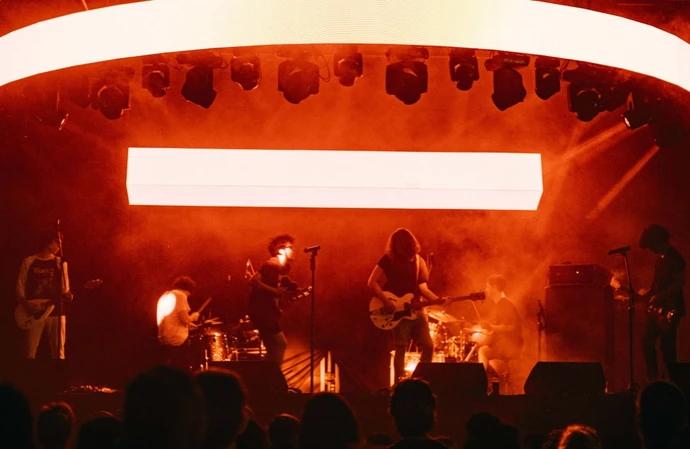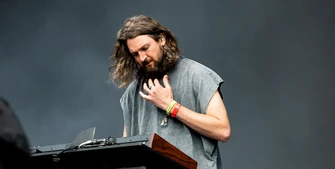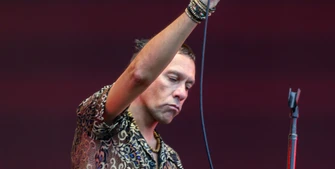Rock remains louder than ever in Argentina - by Phoebe Hennell
Acts such as the Winona Riders are leading a new era of rock in Argentina despite the economic crisis that is affecting the South American nation.

In Argentina, rock isn’t a nostalgic throwback to its former glory days but an alive, mutating rock revolution. Ramones T-shirts are virtually a national uniform, Marky Ramone became an honorary citizen in 2022, and even the President used to sing in a Rolling Stones-style band in the ‘Rolinga’ subculture of Stones superfans.
Argentina was the birthplace of Spanish-language rock and punk in the 1950s and 1970s. It has been a place where guitars scream louder during a crisis – be it dictatorship, economic collapse, or lockdown. Today’s conditions have spurred an intriguing new movement.
The most genuinely subversive punk movements often emerge from repression. Just as the Sex Pistols voiced working-class rage in Thatcher-era Britain, Argentina’s Los Violadores formed in the 1970s under a barbaric military dictatorship, as the Spanish-language punk. During what became known as the 'Dirty War', an estimated 22,000–30,000 dissidents were disappeared, called “desaparecidos” – many jettisoned from planes into the Atlantic. That dark era has left a generational scar, and citizens declare “Nunca más” (never again) in the face of such brutality. The regime censored the arts and media, yet punk found a way of spreading underground as a symbol of resistance.
Similar scenes unfolded in Franco-era Spain, where punk attracted society’s outcasts – queers, anarchists, the unemployed – in Madrid and Barcelona.
In the 1980s, a Rolling Stones-inspired subculture exploded in Argentina. The Rolingas – sporting worn-out jeans, T-shirts with the iconic tongue-and-lips logo, and straight fringes – either played in a Stones-style band or voraciously attended the gigs of them. This urban tribe was so in vogue that even President Javier Milei sang in a Stones-style band in his youth, which is perhaps why Boris Johnson last year reportedly agreed to help Milei meet Mick Jagger. By the early 2000s, the Rolinga trend had dwindled amid the rise of cumbia, the Colombian folk genre. But Stones T-shirts still dot every street corner.
Ramones merch is even more widespread. It’s practically unpatriotic not to own one, and 'Blitzkrieg Bop' is the unofficial national anthem.While the 1970s American punk band was still flying under the radar and playing to small crowds in the US, they were adopted by Argentines as their very own national treasure. Founding bassist Dee Dee Ramone even married an Argentine fan after a chance encounter while searching for his lost guitar outside a hotel.
What’s known as rock nacionál emerged in the shadow of another catastrophe: the Cromañón disaster. In 2004, during a packed Rolinga concert, someone set off a flare inside a club lined with flammable foam. The exits were chained shut to deter gatecrashers, rendering the club a death trap. The deadly inferno swept through the packed concert and killed 194 people. Callejeros, the band performing that night, could never again take the stage without uproar, and were later convicted of murder. This tragedy spelled the end of the Rolinga era, giving way to cumbia and trap as the dominant genres.
But five years ago, there was another shift in sentiment.
Argentina is no stranger to economic crises. The South American nation has suffered a string of them over the last 30 years – it’s no wonder that it’s the nation with the most therapists per person, with psychoanalysis peculiarly remaining the dominant practice. The most recent crisis kicked off in 2018, grinding the value of the peso into the ground. Then lockdown hit. Cooped-up, disillusioned youths found that rock was the more cathartic sound to vent through. When venues re-opened, there was an explosion of hundreds of insatiable rock bands.
Among them, one stands out.
Winona Riders, a psychedelic rock band, has become the face of Argentina’s newest rock movement. They made the cover of Rolling Stone magazine this year, and are a favourite of The Brian Jonestown Massacre’s Anton Newcombe. The band’s origins were in sweaty, graffiti-splattered cultural centres in the more ragged western Buenos Aires suburbs of Morón, but now they are the go-to band to open for the likes of King Gizzard & the Lizard Wizard.
What the present rock movement shares with others throughout history, frontman Ariel Mirabel Nigrelli explains, is that “both scenes have suffered a crisis.” The musical influences of the lead vocalist are evident from the red Spacemen 3 logo tattoo on his torso.
Berated by some and adored by others for their arrogant demeanor, they have become grist for the gossip mill. Now that Winona Riders has broken into the mainstream, Nigrelli says he “likes to, metaphorically speaking, keep it underground – that is, to keep a DIY mind.”
“In 2004, there was the Cromañón nightclub fire, and we had lockdown,” Nigrelli continues. “Art explodes in a different and unique way to survive a crisis. Now we have a fascist government trying to shut every mouth. Lots is happening now, and we’ll only truly understand it later.”
The new wave of Argentine rock is rising in the least fertile of soils. A century ago, Argentina was set to rival the US as a global power. It boasted a GDP per capita twice that of Spain, and outperformed France and Germany. With a vast sweep of natural resources, it should have been a success story.
The nation surpassed the economic powerhouses of France and Germany, boasting a GDP per capita twice that of Spain. Being the South American country with the biggest variety of natural resources, its geography should have set the stage for success.
Today, in a twist of fate, Argentina is in a dire economic crisis. Steeped in juxtapositions and called the “world capital of nostalgia”, it is the land of polo, Malbec, and Jorge Luís Borges, but also endless tangos with debt and unemployment. It’s the country that owes the most money to the International Monetary Fund (IMF).
Artists play sold-out shows by night and work in kiosks or in construction by day. If they are lucky they scrape together pennies to record an album, but touring abroad is a pipe dream. Inflation has rendered first-hand musical instruments virtually impossible for locals to buy.
On Calle Corrientes — Buenos Aires’ answer to the West End — scavengers sift through bins for food. Merchants sell yellowing Playboy and Guitar World magazines from roadside stalls just to eat. Until recently, the grand Teatro Colón opera house overlooked a homeless encampment. That is, until libertarian President Milei came to power in 2023, and the camp disappeared overnight.
With a buzz of his chainsaw, he slashed not only arts and culture budgets but also basic welfare subsidies and allowances. He was met with opprobrium when he tried to rewrite history by denying the alarmingly high figure of victims who were disappeared during the dictatorship.
And yet, through all this, guitars, basses and drums are shouting louder.










